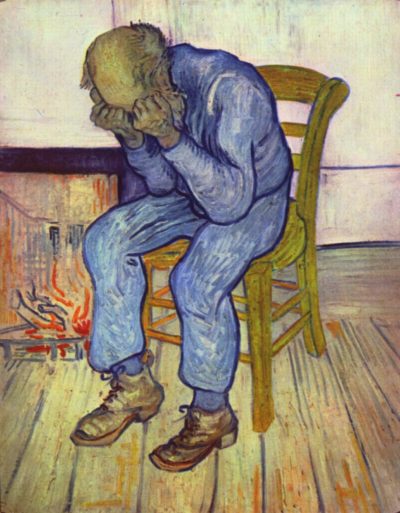
It is postulated that Vincent Van Gogh may have suffered from acute intermittent porphyria
Acute Intermittent Porphyria (AIP)
Acute intermittent porphyria (AIP) is a rare inherited metabolic disease due to a deficiency of an enzyme necessary for the synthesis of hemoglobin in red blood cells (hydroxymethylbilane synthase (HMBS)). Symptoms of AIP usually first becomes evident after onset of puberty and may include acute attacks that are paroxysmal in nature with various combinations of symptoms, such as abdominal pain, autonomic dysfunction, muscle weakness, or mental symptoms.
Key to Links:
Grey text – handout
Red text – another page on this website
Blue text – Journal publication
.
Acute Intermittent Porphyria: an Overview
Several exogenic and endogenic factors induce heme biosynthesis via direct or indirect activation of ALA synthase. In AIP patients with inherited deficiency of HMBS, this results in accumulation of neurotoxic porphyrin precursors (ALA and PBG) in tissues and circulation. Heme, the end product of heme biosynthetic pathway, regulates transcription of ALA synthase via negative feedback and can be used in the treatment of an acute attack.
Management
The management of patients with AIP include following strategies:
During an Acute Attack:
1) treatment with heme preparations, if an acute attack is severe or moderate
2) symptomatic treatment of autonomic dysfunctions, polyneuropathy and encephalopathy
3) exclusion of precipitating factors
4) adequate nutrition and uid therapy
During Remission:
1) exclusion of precipitating factors (education of patients and family doctors)
2) information about on-line drug lists
3) mutation screening for family members and education about precipitating factors in mutation-positive family members.
Management of Patients With Recurrent Attacks:
1) evaluation of the lifestyle
2) evaluation of hormonal therapy in women
3) prophylactic heme therapy
4) liver transplantation in patients with severe recurrent attacks
Monitor for long-term complications including chronic pain
Prevention of Acute Attacks
Avoidance of precipitating factors
While in remission, patients may tolerate medications classified as potentially unsafe, but if porphyric symptoms appear their use should be discontinued or restricted. Long-term impaired nutrition as well as sedentary lifestyle is believed to contribute to muscle atrophy. Maintaining a healthy lifestyle with regular exercise and an anti-inflammatory, normocaloric diet with avoidance of alcohol and smoking is important as is prompt treatment of any infections.
A reduction of excessive stress is essential for improving patients’ prognosis. In the treatment of obesity, the patients with AIP should include carbohydrates into their diet. Fasting may trigger AIP and should be avoided and weight reduction should be done slowly. Carbohydrate loading is known to suppress hepatic ALA synthase activity and has been used to abort mild attacks
Chronic Pain and AIP
Among AIP patients with recurrent acute attacks, chronic neuropathic, myofascial, or abdominal pain often with fatigue is common (18%–22%).
AIP & Neuropathic Pain
Chronic neuropathic is thought to be due to repetitive autonomic and peripheral nerve damage during acute attacks. Mechanisms proposed for AIP-inducing neuropathy include damage from free radicals, ALA neurotoxicity, or heme deficiency in nervous tissue.
Gabapentin is an effective treatment options for AIP-induced neuropathic pain, including neurovisceral pain, and is considered to be safe in AIP. Pregabalin (Lyrica) does not appear to have been studied in AIP but is likely to be safe and effective as well.
Complementary and alternative management of neuropathic pain in AIP would include maintenance of optimal serum levels of Vitamin B12, an essential nutrient for the maintenance of health nerve sheaths. PEA (palmitoylethanolamide) is a medical food with no reported side effects or triggers of AIP that has many reported benefits in neuropathic pain of many origins. As a glial cell suppressor that is believed to reduce neuroinflammation, it may prove effective in AIP as well. The use of acetyl carnitine and alpha lipoic acid may also offer benefit although these agents do not seem to appear on either safe or unsafe medication lists for AIP.
Other
Prophylactic heme infusions may reduce the chronic pain. Regular use of opiates is reported in 30% of AIP patients and may be required although this my induce tolerance and the risk of side effects.
References:
Acute Intermittent Porphyria – Resources
Acute Intermittent Porphyria – Overviews
- An update of clinical management of acute intermittent porphyria – 2015
- Acute Porphyrias in the USA – Features of 108 Subjects from Porphyria Consortium – 2014
AIP – Medication Safety
AIP – Medication Management with Gabapentin
- Treatment of neuropathic pain in acute intermittent porphyria with gabapentin – 2013
- Gabapentin reduces neurovisceral pain of porphyria. – PubMed – NCBI
Emphasis on Education
Accurate Clinic promotes patient education as the foundation of it’s medical care. In Dr. Ehlenberger’s integrative approach to patient care, including conventional and complementary and alternative medical (CAM) treatments, he may encourage or provide advice about the use of supplements. However, the specifics of choice of supplement, dosing and duration of treatment should be individualized through discussion with Dr. Ehlenberger. The following information and reference articles are presented to provide the reader with some of the latest research to facilitate evidence-based, informed decisions regarding the use of conventional as well as CAM treatments.
For medical-legal reasons, access to these links is limited to patients enrolled in an Accurate Clinic medical program.
Should you wish more information regarding any of the subjects listed – or not listed – here, please contact Dr. Ehlenberger. He has literally thousands of published articles to share on hundreds of topics associated with pain management, weight loss, nutrition, addiction recovery and emergency medicine. It would take years for you to read them, as it did him.
For more information, please contact Accurate Clinic.
Supplements recommended by Dr. Ehlenberger may be purchased commercially online or at Accurate Clinic.
Please read about our statement regarding the sale of products recommended by Dr. Ehlenberger.
Accurate Supplement Prices
.
